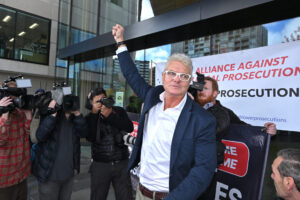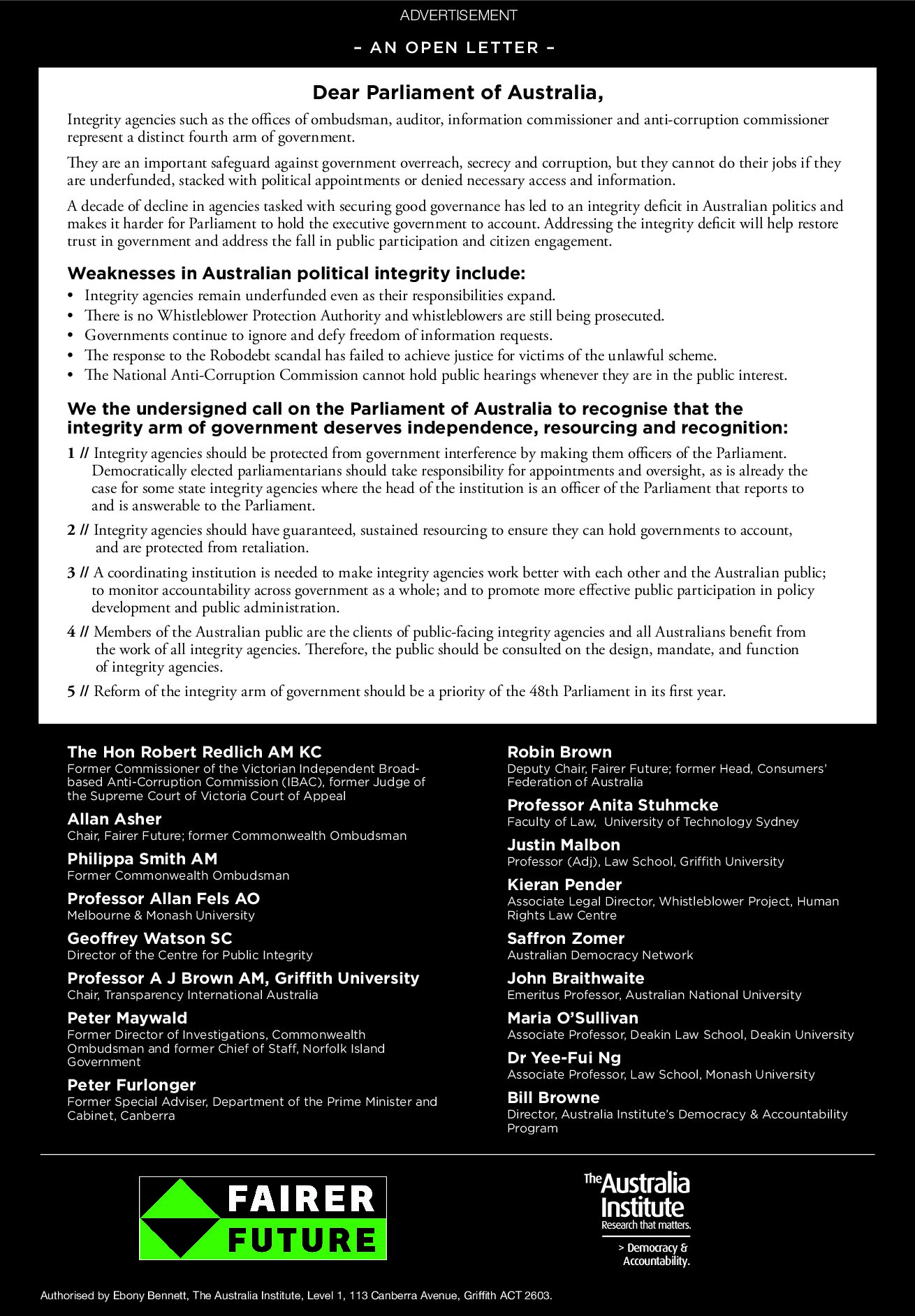The role of the whistleblower in pursuit of climate integrity

Whistleblowers are critical to addressing the climate and biodiversity crises.
As a key accountability mechanism for exposing public and private sector wrongdoing, it is time we recognise the role of whistleblowers in the pursuit of climate integrity.
But without fixing Australia’s broken whistleblowing laws, the risks for whistleblowers to speak up about climate and environmental wrongdoing will remain too high.

Australians voted overwhelmingly for stronger climate ambition and greater integrity and transparency in the last election, and the clock is ticking for the government to deliver.
With the promised reforms to Australia’s environmental laws delayed, and little to show yet for fixing Australia’s failing whistleblowing laws, it remains unclear exactly what this government will hang its hat on in the lead up to the next federal election.
Globally, climate and environmental whistleblowing plays a fundamental role in holding corporations and governments accountable for climate and environmental harm – harm that because by its very nature it is uniquely and exceptionally collectivist, in that it may impact communities far beyond where the initial wrongdoing occurs.
In this way, it can easily be swept under the rug or misidentified. Whistleblowers play a pivotal role in shining a light on this harm, as the eyes and ears of organisations and government agencies, often with the specific expertise to identify where something has gone wrong.

At the 2024 Climate Integrity Summit, Regina Featherstone, Senior Lawyer at the Human Rights Law Centre’s Whistleblower Project, highlighted the role of whistleblowers in the regulatory framework to seek accountability:
We need individual whistleblowers who are close to the decisions, who are close to the science and are close to the actions in the fossil fuel industries to speak up about wrongdoing that is occurring because we don’t have any other accountability happening.
In Australia, environmental whistleblowers have helped expose significant wrongdoing in the pursuit of a safer climate.
From the ex-Santos worker who blew the whistle about dead dolphins and an oil spill, to the nuclear engineer laying bare the ongoing health impacts to First Nation communities of nuclear waste dumping, or the scientists, doctors, nurses and ecologists speaking out against the development of a major petrochemical hub planned for Darwin Harbour.
These whistleblowers are not just bringing the public’s attention to environmental concerns, they are informing the government and private companies that the community is watching.
Yet in Australia, whistleblowers are still faced with a defective regulatory environment, with the Australian Securities and Investment Commission (ASIC) as the only regulator for whistleblowers to safely disclose private sector misconduct.
Just last month, Environment Minister Tanya Plibersek approved the extension of three coal mines in New South Wales, which are now approved to continue operating well into the 2060s. Meanwhile, the government’s Nature Positive Plan, which was set to “restore public accountability and trust in environmental decision-making,” has again been deferred.
It begs the question, who is looking out for our collective interests when it comes to addressing climate and environmental harm?
In July, amid the slow, stunted, and watered-down implementation of the Nature Positive Plan, came a Senate inquiry report pointing scathing critique at ASIC regarding its failure to adequately regulate the corporate arena in Australia. ASIC, whose remit is wrongdoing in the financial services sector, is poorly placed to consider most types of climate and environmental wrongdoing.
But in the current framework, a whistleblower who reports to an environmental regulator or another government agency other than ASIC will not be protected under whistleblower laws. In this perfect storm of regulatory and legislative inaction, demonstrating climate integrity comes at a high risk to whistleblowers in Australia.
As the climate crisis escalates rapidly, we all owe each other a duty to speak up when we see environmental harm occurring – and to be protected when we do so. Whistleblower protection laws have not caught up in recognising climate and environmental risks as a category of wrongdoing posing one of the biggest threats to many Australian communities.

In the current inquiry into the Nature Positive (Environment Protection Australia) Bill 2024, our submission called for the inclusion of whistleblower protections for individuals who feed information about wrongdoing to the proposed national environmental protection agency, to investigate and address. This is a crucial, and long overdue, step for the government to take in improving the regulatory framework.
In our work at the Whistleblower Project, we see the impact that broken laws, a dysfunctional regulatory environment, and the increasingly aggressive response of the private sector are having on whistleblowers who seek to hold the government and private sector accountable for climate and environmental wrongdoing. We can’t continue to expect whistleblowers to shoulder the burden.
How are we meant to ask whistleblowers to act with integrity and speak up when what they’re facing is ruining their whole lives… losing their jobs.
— Regina Featherstone, Climate Integrity Summit 2024
It is high time for this government to catch up when it comes to recognising the role of the whistleblower in the pursuit of climate integrity, and protecting and empowering those who have knowledge of climate and environmental wrongdoing to bring that information to light.
Improving whistleblower protections is a crucial piece of the puzzle in pursuit of climate integrity.

The government can enhance its climate integrity by delivering a federal environmental protection agency to receive whistleblower disclosures of environmental wrongdoing, strengthening whistleblower protections across the public and private sectors, and establishing an independent Whistleblower Protection Authority to advocate for and support those who bravely hold government and the private sector to account.
Madeleine Howle is a Lawyer and Anne Kantor Fellow at the Human Rights Law Centre.
Between the Lines Newsletter
The biggest stories and the best analysis from the team at the Australia Institute, delivered to your inbox every fortnight.
You might also like
Voters overwhelmingly support stronger whistleblower protections – new poll
New polling research by The Australia Institute reveals that 86% of Australians want stronger legal protections for whistleblowers.
Open letter calls on newly elected Parliament to introduce Whistleblower Protection Authority, sustained funding for integrity agencies to protect from government pressure.
Integrity experts, including former judges, ombudsmen and leading academics, have signed an open letter, coordinated by The Australia Institute and Fairer Future and published today in The Canberra Times, calling on the newly elected Parliament of Australia to address weaknesses in Australian political integrity. The open letter warns that a decade of decline in agencies
Safe to speak: protecting the whistleblower | Kieran Pender
For most would-be whistleblowers, the cost of courage is way too high. A whistleblower protection authority would ease their path.



